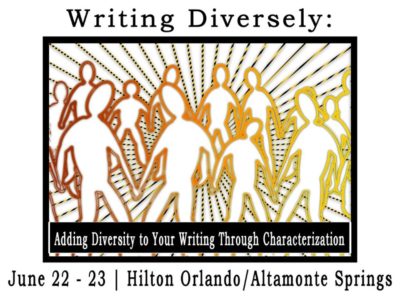 You and I are not the same.
You and I are not the same.
Maybe our skin color doesn’t match. Maybe you are male, while I am female. Perhaps it is our political philosophy that differs, or our level of physical ability. Maybe our sexual orientations run along separate paths. None of this makes one of us better, or worse, than the other.
In fact, our differences give us variety, individuality, uniqueness.
Our differences make the world better.
As writers it is vital that we not only pay attention to these differences, but that we employ them in our work on a regular basis because, at its base, literature is a reflection of the truth. Through literature a person can learn that they are unique, but not alone. That difference is not less, or worse, or culpable.
Authenticity makes a difference.
Writing authentic characters of diverse backgrounds, ethnicities, abilities and orientations enriches the tapestry of any world the writer creates. Better yet, it provides an honest reflection of the real world. Such characters offer a broader range of perspectives and perceptions, and gives the reader the ability to see the world through another’s eyes. Such range of depictions can bring the beginning of understanding and acceptance, thus encouraging the demise of hate and prejudice.
Sound lofty and unrealistic? Maybe. But if that’s true, why are they still banning books like To Kill a Mockingbird, The Kite Runner, Thirteen Reasons Why, The Hate You Give, A Brave New World, All Quiet on the Western Front, and The Satanic Verses?
Cultural Recognition
The broader culture is beginning to recognize the need for diversity, resulting in the introduction of characters whose real-life counterparts are seen every day, in every town. Increased awareness results in increased representation, paying dividends to all readers.
The reader-from-an-under-represented-category gains by seeing someone like themselves in a book they enjoy, thus making it more likely that they will seek out another book to read, not to mention the more important possibility that they will feel “seen,” more understood, and less isolated.
The majority-reader has the opportunity to learn about people with different life experiences and viewpoints from their own, broadening their worldview and hopefully, their understanding.
Financially Savvy and the Flip Side
Writing diverse characters also makes good financial sense. Books that include characters of color, LGBTQ characters, characters with disabilities, etc. are topping the best seller and awards lists in most, if not all, genres. Yet, many of them are banned, and even burned, for what is deemed controversial content.
The flip-side of this increase in representation is that not everyone does it right. Books like the Skippyjon Jones series (Schachner) have been panned by advocates for presenting stereotypical or derogatory depictions. And the truth is, writing characters who are not like you is rather like trying to find hidden treasure without a map. Because you have only your own perspective and perceptions to base the character on, you are nearly certain to make a few missteps without ever realizing you’ve strayed from the authentic path.
Why should diversity matter to me?
Because you and I are not the only ones out there. If we are to depict truth in our art, we need to show all sides of humanity, not just people who look like us.
Because it matters to your reader; the person you are trying to reach, engage, teach or just entertain. Turn them off on such a basic level – the level of their own identity and sense of self – and they will never pick up another book with your name on it again. Worse yet, they are quite likely to suggest that others follow suit. As a wise woman once told me, “your reputation is your calling card in this world. Don’t drop it in the mud.”
Because part of the reason we write is the legacy we leave, and a lack of representation limits us as writers as much as it limits our audience. Ghandi told us to “be the change we want to see in the world.” Writing diversely is one way to do that.
Want to know more about writing diverse characters?
Check out the upcoming mini-conference: Writing Diversely. Four speakers, including advocates, authors, and industry professionals, will be presenting at the Hilton Orlando/Altamonte Springs on June 22-23 in a two-day workshop on writing diverse characters.

Karen Cooper
Thanks for writing this. I am Cherokee, born in Oklahoma, a state full of American Indian people. I cringe at books with a stereotypical American Indian character, and realize that such authors either didn’t know a single American Indian, or they knew a wanna-be Indian who acted the role in life.
Bethanie Gorny
Try reading “There, There” by Tommy Orange. He is a Native American who wrote this prize winning book about Oakland CA Native Americans.
Cheri L. Roman
I’ll look for it. Thanks!
Cheri L. Roman
My pleasure. It is important to depict diversity in authentic ways.
Bethanie Gorny
Try reading “There, There” by Tommy Orange. He is a Native American who wrote this prize winning book about Oakland CA Native Americans.